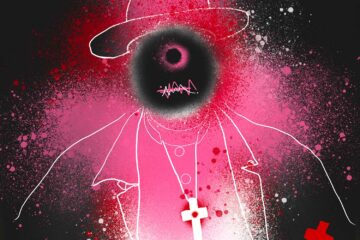Overview: Dr. Chip Thomas, a.k.a. “Jetsonorama,” as a boy, avoided the violence of school desegregation by spending a fateful few years in a Quaker community. He later carried those Quaker values with him into a four-year commitment to serve as a young doctor on the Navajo Nation. That was in the Eighties. He’s still there, more than 30 years later, and has become an integral part of the community, not only as a doctor, but as a public artist and activist.
In this conversation, we talk about Chip’s recent selection by the United Nations as one of nine artists being highlighted for #UN75. We talk about the disproportionate suffering on the Navajo Nation and “soul wounds.” Chip earned a Guinness World Record for a 12,000-mile cycling trek the length of Africa. And on another cycling adventure met the brink of death in the grip of a widow-maker heart attack. These things and much more in this episode of the Humanitou Podcast.
Also on Apple, Spotify, Pandora, Stitcher, YouTube, Google and other players.
EP 107 SHOW NOTES, LINKS & INTRO TRANSCRIPT*
Connect with Dr. Chip “Jetsonorama” Thomas:
Website: jetsonorama.net
Instagram: @jetsonorama
References
AfricaTrek documentary: youtu.be/8PSVCO99qmY
Aid the Navajo Nation: navajohopisolidarity.org, kinlanimutualaid.org, wearenavajo.org, digdeep.org (Navajo water project)
Connect with Adam Williams / Humanitou:
Humanitou on Instagram: @humanitou
Subscribe: Humanitou Newsletter
Photography
Portrait of Chip by Ben Moon
Intro/Outro Music
“Tupac Lives” by John Bartmann | freemusicarchive.org
*Full transcript coming.
INTRO TRANSCRIPT
Welcome to Humanitou. I’m Adam Williams, creator and host of this podcast series about humanness and creativity.
Today, I’m talking with Dr. Chip Thomas, also known as “Jetsonorama.” He’s a family care physician on the Navajo Nation in Arizona. He’s also a widely known and respected public artist.
And he’s got stories. Many more stories than we had time for in this one conversation, but we got a heckuva start.
More on that in a minute.
I often describe Humanitou as being about humanness and creativity. And in these podcast conversations, of course we dive into the stories and insights of my guests, like Chip, but I also see this in a bigger way as a vehicle for connecting with you, and all of us together, too.
So along the way, as Chip shares incredible pieces and perspectives from his own lived experiences, consider this question that I ask in every episode: How do you live humanness and creativity in your life?
Now, Chip.
He was recently selected by the United Nations for his Painted Desert Project, one of only nine artists from around the world chosen to be part of an initiative that marks the UN’s 75th anniversary.
And in this conversation, Chip and I talk “street art” versus “public art,” and how the good doctor got his street name, Jetsonorama.
He grew up in the South, in Raleigh, North Carolina, When the schools were being desegregated in the late Sixties, that led to one of the most profoundly shaping experiences of his life, and to the Quaker philosophy that guides his life even now.
As a young, new doctor, he went to serve a four-year commitment on the Navajo Nation, where still today more than 30 percent of the homes do not have a water tap or toilet, and nearly 30 percent do not have electricity. Chip made that four-year commitment in the Eighties. He’s still there, more than 30 years later.
We get into the extraordinary impact of COVID-19 on the Navajo people, and the uranium-tainted atomic history that lives on in the lands and lives there. We talk about the “soul wounds” that persist. …
And with that in mind, real quick, a side note here: I’ve included in the show notes for this episode links to four organizations, which Chip likewise shares on his website, that serve people on the Navajo Nation who need our help. After you listen to this conversation with Chip, please go to the show notes and learn more.
On other subjects, Chip and I share plenty of laughs. We talk about some master storytellers that have influenced his work as a documentary photographer, and how he views the creative social practice of that work, on the Navajo Nation and elsewhere in the world.
And then there’s his 12,000-mile cycling trek that earned him a Guinness World Record. (By the way, I’ve posted a link to the documentary of that trek, as well, in the show notes.)
And there was the widow-maker heart attack on a separate cycling adventure that took him to the edge of death at age 44.
We talk about other things, too.
Here is my conversation with Chip Thomas.
…
Also on Apple, Spotify, Pandora, Stitcher, YouTube, Google and other players.


